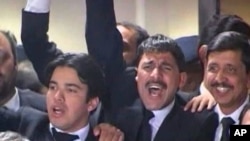December 27, 2007. Pakistan's charismatic former Prime Miister Benazir Bhutto, was assassinated during her election campaign, as she vowed to end military rule and restore democracy in the country.
Her husband, Asif Ali Zardari, then led her Pakistan People's Party to victory and later became president after Pervez Musharraf stepped down late last year. But analysts say the Zardari government is too shaky. They point to the economy as well as the recent decision by the Supreme Court to reopen corruption cases against Mr. Zardari and some of his cabinet members.
Lawyers were jubilant, and the court action was also welcomed by many ordinary Pakistanis.
Some say the Supreme Court's move could have the support of the Army, which they say feels embarrassed by President Zardari.
Lisa Curtis is a senior analyst at the Heritage Foundation.
"You know what he said on 'no-first use' of nuclear weapons, I don't think that was authorized by the military and I think it made the military nervous. Some of his efforts to make overtures to India, that was not appreciated," she said.
But Shuja Nawaz at the Atlantic Council says the Supreme Court decision will help to shake the government out of its complacency and will force it to be more effective.
"The fact that the cases [of corruption] have been reopened means that the people who have been charged, and it is over 8,000 of them, will get a chance now of a speedy trial. No more the old system where somebody could be in jail for 11 years, as was in the case of Mr. Zardari," he noted.
But Nawaz says he is concerned that the court could cross the limits in its judicial activism.
"...I am more concerned about the Supreme Court getting into micromanaging the government, identifying positions that need to be filled and candidates that need to be considered for those positions," he added. "There are some reports that it wants to do that and I think there should be a measure of caution."
Lisa Curtis at the Heritage Foundation says she is worried more about political uncertainty coming at a time when U.S.-Pakistan relations are tense. She points to Americans having difficulties in getting Pakistani visas and U.S. diplomats being searched at the Pakistani airports.
"I think as Pakistan feels more pressure from the U.S. to go after the Afghan Taliban, to shut down the [terrorist group] Lashkar-e-Taiba, it is trying to see what sticks it has in its tool kit to be able to push back on the U.S," she noted.
Nawaz says he also is concerned about U.S.-Pakistan relations. Hee says they could take a "deep dive" if the two sides are not careful. He says the U.S. must understand Pakistan's long-term concerns in the region.
"And Pakistan has to realize that the U.S. is also facing a political timetable at home, which is obviously behind many of the calls for early action by Pakistan against the Afghan Taliban," he said.
As for Pakistan's democracy in the wake of the Bhutto assassination two years ago, both analysts describe situation as mixed.
Nawaz says it is much better because Pakistan now has a civilian administration, a restored judiciary and public support to fight militants. But Curtis says the democracy in Pakistan has not taken root yet, because the civilian government must work fast toward building democratic institutions and reining in corruption.
News
Analysts: Democracy in Pakistan Yet to Take Root
update

Two years after the assassination of former Pakistani prime minister Benazir Bhutto, the political situation there can best be described as unstable and fragile.



